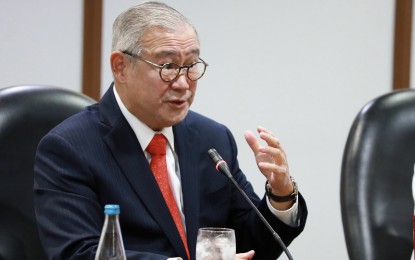
Foreign Affairs Secretary Teodoro Locsin Jr. (File photo)
MANILA – The Philippine government supports the United Nations' anticipatory action to address the impact of natural disasters on communities.
In a high-level humanitarian event last September 9, Foreign Affairs Secretary Teodoro Locsin Jr. cited the need for action as the country has been plagued by the numerous typhoons, earthquakes and volcanic eruptions.
"It is because of these experiences, burned into our collective memories, that the Philippines is committed to anticipatory action. We’ve gained the wisdom that predicting, preventing and mitigating the shock and impact of a disaster are key to risk reduction and management," he said in his statement by the Department of Foreign Affairs (DFA) on Tuesday.
Locsin said the country has reflected this in the National Disaster Risk Reduction and Management Plan and the Philippine Development Plan (PDP), which mandates data sharing and the establishment of platforms for managing disaster-related information, as well as providing for capacity building for local anticipatory planning.
The UN has selected the Philippines as a pilot case for its USD7.5 million (approximately PHP374.7 million) "tropical cyclone anticipatory action" to address typhoon-related disasters.
READ: UN picks PH as pilot case for 'anticipatory action' on cyclones
The UN Office for the Coordination of Humanitarian Affairs (OCHA) said the pilot builds on the existing capacity of numerous organizations and networks already working on forecast-based financing while being deeply rooted in operational realities of responding to typhoons in the Philippines, including Covid-19 compounding effects.
Bicol Region and Eastern Visayas will serve as the pilot areas since they are most often where destructive typhoons made their initial landfall, which brings the greatest damage in terms of wind impact and storm surge.
The pilot anticipatory action will involve setting up a trigger mechanism that corresponds directly to the tropical cyclone hazard. The mechanism then enables the activation of the framework and release of pre-agreed funds.
As an active supporter of the UN Central Emergency Response Fund, Locsin said the Philippines look forward to working as a pilot country for the initiative.
"We are an active supporter of the UN Central Emergency Fund. We contribute USD50,000 yearly and that’s peanuts. We can give more, much more. We have the money when we need it, as this pandemic has shown," he said.
"We look forward to working as a pilot country with CERF in its project on anticipatory action to typhoons. The best policies are based on common sense. We all have that. We just need the will to think and act on it," he added.
According to UN OCHA, approximately 20 tropical cyclones enter the Philippine Area of Responsibility (PAR) yearly and an average of five of these are potentially destructive. (PNA)
